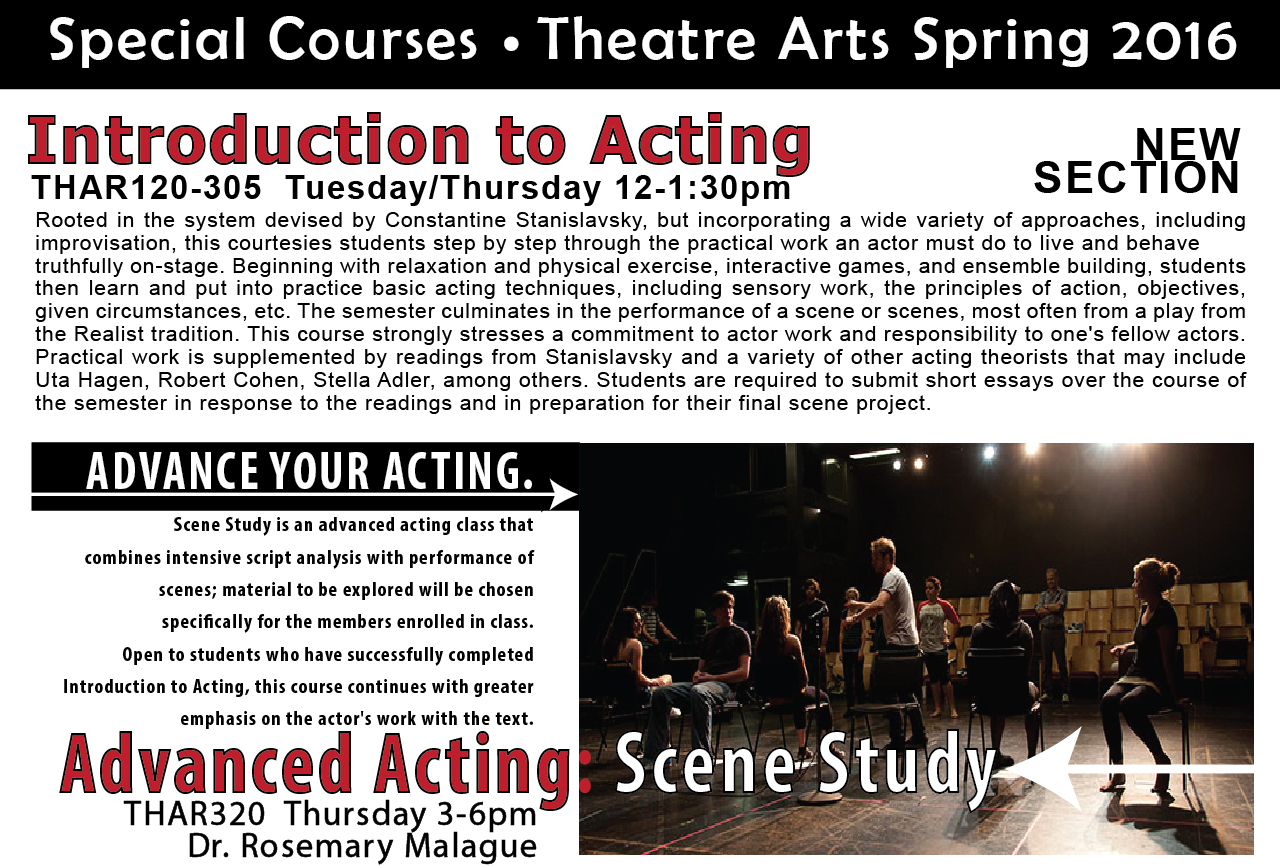
Theatre Arts courses are open to the entire University of Pennsylvania student community.
Please contact individual instructors with questions about our classes.
INTRODUCTION TO ACTING
THAR 120-305 Tuesday and Thursday 12:00 pm to 1:30 pm Rose Malague
Rooted in the system devised by Constantine Stanislavsky, but incorporating a wide variety of approaches, including improvisation, this courtesies students step by step through the practical work an actor must do to live and behave truthfully on-stage. Beginning with relaxation and physical exercise, interactive games, and ensemble building, students then learn and put into practice basic acting techniques, including sensory work, the principles of action, objectives, given circumstances, etc. The semester culminates in the performance of a scene or scenes, most often from a play from the Realist tradition. This course strongly stresses a commitment to actor work and responsibility to one's fellow actors. Practical work is supplemented by readings from Stanislavsky and a variety of other acting theorists that may include Uta Hagen, Robert Cohen, Stella Adler, among others. Students are required to submit short essays over the course of the semester in response to the readings and in preparation for their final scene project.
Advanced Acting: Scene Study
Thar 320-301 Tuesday and Thursday 3 pm to 4:30 pm Rose Malague
Scene Study is an advanced acting class that combines intensive script analysis with performance of scenes; material to be explored will be chosen specifically for the members enrolled in class. Open to students who have successfully completed Introduction to Acting, this course continues with greater emphasis on the actor's work with the text. We will study several plays together as a group, conducting Stanislavskian table work. We will then workshop and perform scenes from these plays in subsequent class sessions. In consultation with the instructor, students will identify individual goals, building on discoveries made in other Theatre Arts courses and/or prior stage work, exploring roles and plays that present actors with new challenges and expand their range. Depending on the number of students enrolled in the class, we are likely to perform at least three scenes and a monologue. Plays will be read alongside key theoretical texts, and class work will be complemented by attendance at selected live productions on campus and in Philadelphia.
Please note: The only pre-requesite for this class is completion of THAR120. Email instructor with any questions.
If you have questions contact Dr. Rosemary Malague: rmalague@sas.upenn.edu
Dramaturgy
Thar 274-401 Tuesday and Thursday 10:30 am to 12 Noon Cary Mazer
This course will examine the functions and methods of the dramaturg--the person in the theatrical process who advises the artistic collaborators on (among other things) new play development, the structure of the script, the playwrights biography and other writings, the plays first production and its subsequent production history, and the historical and regional details of the period depicted in the plays action. We will study the history of the dramaturg in the American theatre and discuss contemporary issues relating to the dramaturgs contribution to theatrical production (including the legal debates about the dramaturgs contribution to the creation of Rent). And, in creative teams, the class will create dramaturgical portfolios for a season of imaginary (and, potentially, a few actual) theatrical productions.
Public Art, Performance, And Community Engagement
Thar 275-402 Tuesday and Thursday 10:30 am to 12 Noon James Schlatter
The focus of this practical course, offered in partnership with the Ben Franklin Scholars Program and the Netter Center, will be on the construction of a public art and performance space in West Philadelphia. Students will conduct research into the recent history and current state of public performance art, particularly work created in close collaboration and dialogue with local communities. Much of the work of the course will be engaging the West Philadelphia community—neighborhood groups, schools, and arts organizations in a discussion about what form the public art space will take, what works it will include, and in what location it will be installed. The general frame for the work will be the shared life of West Philadelphia, a celebration of its history, traditions, and inhabitants. Students will be integrally involved in all aspects of the conception, design, and construction of the art space, including addressing the critical issue of the appropriation of public

 Theatre Arts Program
Theatre Arts Program